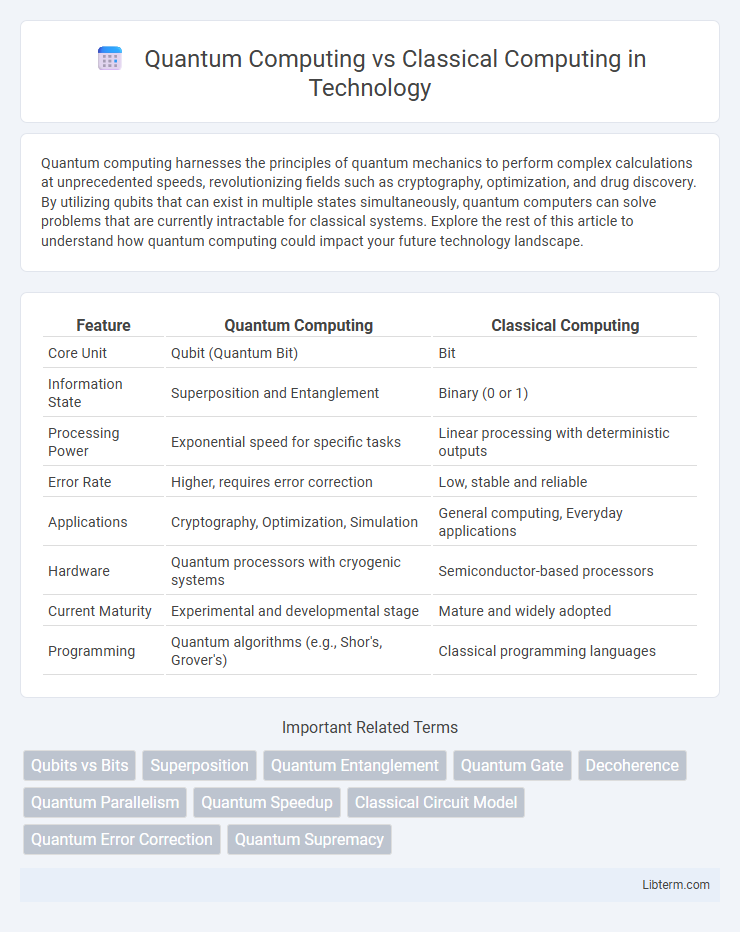Quantum computing harnesses the principles of quantum mechanics to perform complex calculations at unprecedented speeds, revolutionizing fields such as cryptography, optimization, and drug discovery. By utilizing qubits that can exist in multiple states simultaneously, quantum computers can solve problems that are currently intractable for classical systems. Explore the rest of this article to understand how quantum computing could impact your future technology landscape.
Table of Comparison
| Feature | Quantum Computing | Classical Computing |
|---|---|---|
| Core Unit | Qubit (Quantum Bit) | Bit |
| Information State | Superposition and Entanglement | Binary (0 or 1) |
| Processing Power | Exponential speed for specific tasks | Linear processing with deterministic outputs |
| Error Rate | Higher, requires error correction | Low, stable and reliable |
| Applications | Cryptography, Optimization, Simulation | General computing, Everyday applications |
| Hardware | Quantum processors with cryogenic systems | Semiconductor-based processors |
| Current Maturity | Experimental and developmental stage | Mature and widely adopted |
| Programming | Quantum algorithms (e.g., Shor's, Grover's) | Classical programming languages |
Introduction to Quantum and Classical Computing
Quantum computing leverages quantum bits or qubits, which exploit superposition and entanglement to perform complex calculations at unprecedented speeds, surpassing classical binary bits limited to 0 or 1 states. Classical computing relies on deterministic logic gates and binary states, using bits that represent either 0 or 1 to perform operations sequentially or in parallel. Quantum systems enable exponential scaling in processing power for specific problems like cryptography and optimization, distinguishing them fundamentally from classical computing architectures.
Fundamental Principles: Bits vs Qubits
Quantum computing leverages qubits, which can exist simultaneously in multiple states due to superposition, unlike classical bits that are limited to binary values of 0 or 1. Qubits also exhibit entanglement, enabling complex correlations that enhance computational power beyond classical capabilities. This fundamental difference allows quantum computers to potentially solve specific problems exponentially faster than classical computers.
Computing Power and Speed Comparison
Quantum computing leverages qubits and quantum superposition to process complex computations exponentially faster than classical computers, which rely on binary bits and sequential processing. Classical computing speed is limited by transistor switching speeds and binary logic gates, whereas quantum computers can solve certain problems, such as factoring large numbers or simulating quantum systems, in polynomial or even exponential time reductions. The comparative computing power of quantum machines, exemplified by quantum supremacy demonstrations, promises transformative advances in cryptography, optimization, and machine learning, outpacing classical architectures for specific computational tasks.
Algorithms: Quantum Advantages and Classical Strengths
Quantum computing leverages quantum algorithms like Shor's and Grover's to solve specific problems exponentially faster than classical counterparts, particularly in cryptography and search tasks. Classical algorithms excel in stability, error correction, and broad applicability across diverse computational problems, maintaining efficiency for large-scale data processing and deterministic computations. The interplay between quantum speedup for certain problem classes and classical reliability underscores ongoing research in hybrid quantum-classical algorithm development.
Error Rates and Stability Challenges
Quantum computing faces significantly higher error rates compared to classical computing due to qubit decoherence and quantum noise, which challenge computational accuracy. Stability issues arise from the fragile nature of qubits and their susceptibility to environmental disturbances, necessitating advanced error correction techniques such as surface codes and fault-tolerant architectures. Classical computing benefits from mature error detection and correction methods, resulting in far greater operational stability and reliability in processing tasks.
Current Applications in Industry
Quantum computing excels in solving complex optimization problems, drug discovery, and cryptography by leveraging qubits and superposition, enabling faster processing of specific tasks compared to classical computing. Classical computing remains dominant in general-purpose applications, data management, and large-scale simulations due to its stable and well-established architecture. Industries such as finance, pharmaceuticals, and logistics are actively exploring hybrid approaches to combine quantum algorithms with classical systems for enhanced computational efficiency and innovation.
Scalability and Hardware Requirements
Quantum computing leverages qubits that exponentially increase computational power, but current quantum hardware remains limited by qubit coherence, error rates, and cooling requirements, challenging scalability. Classical computing relies on silicon-based transistors with well-established fabrication processes, enabling high scalability through Moore's Law, yet facing physical limits as transistor sizes approach atomic scales. Advancements in quantum error correction and qubit interconnectivity are crucial for achieving scalable quantum systems, while classical hardware improvements focus on efficiency and miniaturization to sustain performance growth.
Security Implications: Quantum vs Classical Encryption
Quantum computing poses significant challenges to classical encryption methods, primarily due to its ability to efficiently solve problems like integer factorization using Shor's algorithm, threatening RSA and ECC cryptographic systems. Quantum encryption, particularly Quantum Key Distribution (QKD), leverages quantum mechanics principles such as superposition and entanglement to enable theoretically unbreakable communication security. As quantum technologies advance, hybrid models integrating quantum-resistant algorithms alongside classical protocols are critical to safeguarding data integrity and confidentiality in the evolving cybersecurity landscape.
Future Prospects and Limitations
Quantum computing promises exponential speed-ups in solving complex problems like cryptography, optimization, and drug discovery, far surpassing classical computing capabilities. However, current quantum hardware faces limitations including error rates, qubit coherence times, and scalability challenges that must be overcome before widespread practical application. The future of computing hinges on hybrid models integrating both technologies to leverage quantum advantages while relying on classical systems for stability and versatility.
Conclusion: Quantum and Classical Computing Coexistence
Quantum and classical computing each excel in different domains, with quantum computers offering unprecedented speed for complex problems like cryptography and optimization, while classical computers remain efficient for everyday tasks and general-purpose computing. The coexistence of both technologies enables leveraging their unique strengths, promoting hybrid models that optimize performance and resource allocation. Future advancements will likely see integrated systems where quantum processors complement classical infrastructure, driving innovation across industries.
Quantum Computing Infographic

 libterm.com
libterm.com